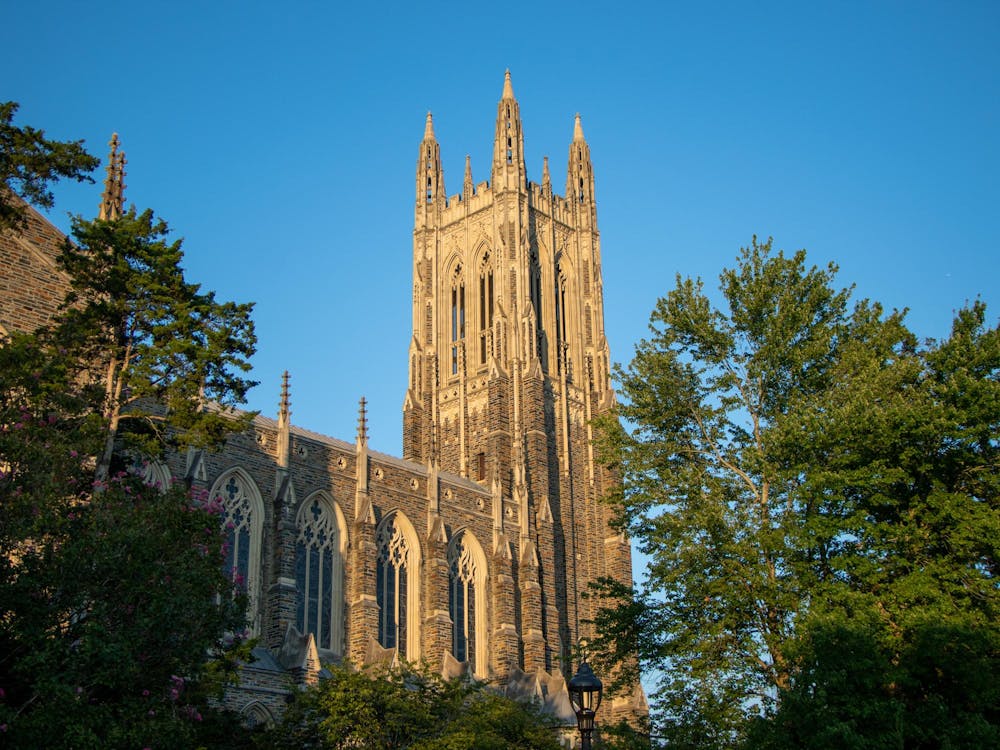For 53% of undergraduate students, research is a core component of their Duke experience.
As an R1 institution, the University spends at least $50 million on research annually and awards at least 70 research doctorates per year in any academic field.
Duke provides students with many pathways to become involved with research on campus across STEM fields and the humanities. The Chronicle spoke with four students who reflected on their experiences navigating the undergraduate research scene.
Research at Duke, by the numbers
In the 2022-23 academic year, the University surpassed $1.39 billion in total research expenditures, submitting 5,925 proposals and 11,390 publications. Through Duke’s Office for Translation & Commercialization, 15 startups and 325 new invention disclosures were launched, resulting in 104 issued patents.
“Our scholars and researchers continue to build new understandings of the human condition and enrich our future through their creative output,” wrote Jennifer Lodge, vice president for research & innovation, in a statement accompanying the 2022-23 OR&I Annual Report.
Many of the University’s research and learning centers also received major awards and grants this year.
In 2023, the University received $10 million from Beth Schiff, Trinity ‘81 and Law School ‘85, and Jim Schiff, Trinity ‘81, to advance initiatives and labs in the humanities. Duke was awarded another $10 million by the Margolis Family Foundation to support the work of the Margolis Institute for Health Policy.
This month, the University received a $30 million award to support a historic faculty hiring initiative for promoting research in artificial intelligence and computing.
The School of Medicine also received more than $551 million in federal funding from the National Institute of Health in 2023, the seventh-largest sum awarded to an academic medical center. For 20 of the last 23 years, the University placed among the top 10-highest NIH-funded medical institutions in the nation.
Supporting student research
Many of Duke’s undergraduate research opportunities are administered through the Undergraduate Research Support Office led by director Jessica Harrell.
To help navigate Duke’s research scene, the URS Office acts as a starting point by bridging students with faculty, organizations and campus partners. It serves as a hub of information that guides students to initiatives like Muser, while providing extensive funding opportunities ranging from independent study grants to summer fellowships.
“We have increased the number of students we provided funding support to over the last year, and that is likely indicative of an increase in the number of students that are engaging in research,” Harrell wrote in an Aug. 16 email to The Chronicle.
Harrell emphasized that these resources are open to all Duke students on a first-come, first-served basis, regardless of whether they have prior research experience.
For students who want to discuss research experiences with their peers, the URS Student Advisory Council — an undergraduate committee — serves as a liaison between the URS Office and students. The council meets monthly to discuss the best ways to promote research among students, such as by tabling on campus.
“The advisory council is a collection of students from different walks of life, different grades and different research experiences that provide a holistic view of how to get involved in research at Duke,” said senior Rani Jones, a URS Student Advisory Council member.
Harrell added that she has noticed a recent increase in undergraduate engagement beyond traditional STEM-related fields.
“We are seeing more exciting engagement in undergraduate research in the arts and humanities disciplines, and we rolled out a new arm of our Summer Undergraduate Research Fellowship program this summer for students interested in engaging in arts and humanities and social science research,” Harrell wrote.
This observation goes against the tide of a nationwide decline in humanities enrollment, a trend similarly faced by Duke within the last decade.
Get The Chronicle straight to your inbox
Sign up for our weekly newsletter. Cancel at any time.
Harrell noted that the URS Office is brainstorming ways to assess the success of undergraduate research. Tactics include administering surveys, quantifying the number of students in various disciplines and tracking the number of students pursuing an honors thesis.
Navigating research opportunities
For many Duke students, research has been an integral part of their undergraduate experience.
Rose Naderi, Trinity ‘24, was a member of the Duke Identity & Diversity Lab for over two years while completing an independent study and honors thesis, where she investigated how language impacts children’s understanding of social groups as they age. Outside of the lab, she participated in a Bass Connections team that provided social support to antepartum patients at Duke Hospital and surveyed the effectiveness of social support methods.
Naderi, who is now pursuing a master’s degree, believes that Duke has set her up for success for future research. In particular, she said she feels prepared to present her future research and break it down in terms that can be understood by a broader audience.
She also identified mentorship as a key component of her research experience.
“Dr. [Sarah] Gaither, [Nicholas J. and Theresa M. Leonardy associate professor] and my graduate student mentors have influenced my research career so much and have been so inspiring to me to even want to pursue a thesis and master’s [degree],” Naderi said.
However, she believes that undergraduate research experiences at Duke are not equally accessible to students, viewing some students as benefiting from prior connections and research experiences.
Junior Karina Lu has had extensive research experience at Duke, from studying Tibetan dialects to considering “historic corollaries” for imagining “future space settlements” and their governance.
As a history and French & Francophone studies major, Lu considered her only avenues for conducting research to be applying for a Bass Connections team — which emphasizes interdisciplinary research — or asking a professor if she can join their lab.
Lu appreciates that the culture surrounding undergraduate research at Duke does not feel competitive, but views it as more difficult for humanities students to find research targeted to their specific area of study.
“Duke doesn’t advertise a lot of the more granular research opportunities, and I had to go seeking for them, such as talking with the [directors of academic engagement] and my humanities professors,” she said.
To help students find opportunities, Lu suggested that the University explain research opportunities during first-year orientation and at events such as Sophomore Spark.
Senior Allie Brown, a URS Student Advisory Council member, noted that the council is available to answer any questions students have about getting involved in research.
Lu believes having an open mind is an important trait for students interested in pursuing research at Duke.
“Doing research is an exhausting thing that you have to balance with your schoolwork and your extracurriculars,” she said. “But it can be extremely rewarding and eye-opening if you find something you are passionate about.”

Andrew Bae is a Trinity junior and an editor-at-large of The Chronicle's 120th volume.

